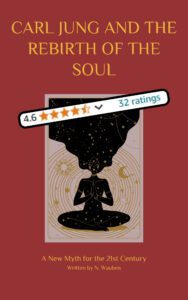Table of Contents
General Introduction
The Black Books consist of 7 volumes written by Carl Jung between 1913 and 1932. They were not available to the general public until the end of 2020, when Sonu Shamdasani published an edited edition, including an introduction to the Black Books. As Sonu Shamdasani indicated at the back of the book-set, they were the most important unpublished work written by Carl Jung.
In this series of 7 articles, I analyse, summarize, and discuss each volume separately. In this article I will discuss the fourth volume of the Black Books, the discussion of the first volume can be found here: Introduction to the Black Books: Volume 1, the second volume here: Carl Jung – the Black Books Volume 2: Challenges Inherent to the Exploration of the Unconscious., and the third volume here: The Black Books Volume 3: Look where you least want to Look. If you do not want to miss the discussion of the following volumes of Carl Jung’s Black Books, please consider subscribing to my newsletter or YouTube channel, which can be done here: Newsletter & Youtube
Introduction to the Black Books Volume 4 and Summary of Volume 3
Throughout the third volume of the Black Books some interesting interactions between Carl Jung and characters emerging from the unconscious are presented to the reader. Jung is finally able to have the interactions with his unconscious which he was seeking. He reached this point by (1) letting go of his reliance on scientific truths and (2) by looking at the places where he least wanted to look.
These interactions continue throughout the fourth volume of the Black Books, and it becomes clear that Carl Jung gradually became more comfortable and confident during these interactions; perhaps even a bit too confident at times. Carl Jung appears a lot less afraid of the characters and is capable to engage in some interesting discussions with these characters.
Nietzsche’s Truth
At the beginning of the fourth volume Carl Jung addresses the ideas of Friedrich Nietzsche in an interaction with a librarian. The librarian argues that, although religions have lost their importance to a significant degree, authors such as Nietzsche have been able to fill the void by writing their own ‘books of prayer’. In the case of Nietzsche this was Thus Spoke Zarathustra.
Carl Jung, however, argues that Nietzsche’s philosophy can only fill this void for a select group of individuals; those that are too constraint and require more freedom and independence: “Nietzsche’s truth strikes me as too agitated and provocative –; it’s good for those who are yet to be set free.” (p.204) Another group of people, those that are perhaps too ‘free’, require a different philosophy, according to Carl Jung, one that provides them with certain boundaries and resignation: “I’ve recently discovered that we also need a truth for those who need constraint. It’s possible that instead they need a depressive truth, which makes man smaller and more inward.” (p.204)
I believe that Carl Jung, throughout his work, explored such a truth intensively. Whereas Nietzsche’s philosophy was aimed at making man feel more superior, and at motivating them to remove all chains, including those from societies and religions, Jung was, in some ways, developing a philosophy which addressed the inferiority of man. An inferiority which resulted from man being under a strong influence of the unconscious forces of the soul. At the same time, however, once one was aware of this inferiority, it could be empowering as well.
One example found in volume four of the Black Books is the recognition of madness: “Let the light of your madness shin, and it will suddenly dawn on you. Madness is not to be despised and not to be feared, but instead you should give it life.” (p.211) Carl Jung believed that everyone is filled with madness to some degree and the sooner one recognizes this the better. Moreover, according to Jung, striving towards reason is often useless, and, in part, merely done in order to feel less inferior “Man strives toward reason only so that he can make rules for himself. Life itself has no rules. That is its mystery. What you call knowledge is your attempt to impose something comprehensible on life.” (p.212)
In this sense I believe that Carl Jung managed to create a philosophy which was a great addition to the philosophy of Friedrich Nietzsche. Whereas Nietzsche empowered man by indicating in which ways humans can be powerful and independent, Jung indicated in which ways humans can be vulnerable and powerless. The Black Books are in important source of this philosophy.
Life becomes Truth
In a similar way, according to Jung, we should not try to find meaning and truth all the time, instead we should just ‘live the truth’: “We create the truth by living it. Only in retrospect life becomes truth. We do not find truth first and then we live it, but the other way around.” (p.215) Equally, we should embrace all aspects of life and respect that one aspect cannot be without the other: “Life should proceed, from birth to death and from death to birth – from sense to madness and from madness to sense – unbroken like the path of the sun – Everything should proceed on this path.” (p.216)
It is also interesting to note that, while Carl Jung was having these interactions with his own unconscious, which might seem like a sort of madness, Jung was purposely trying to live a normal life: “Thereafter I walk on like a man who is tense, and who expects something new that he has never suspected before. I listen to the depths – warned, instructed, and undaunted – outwardly striving to lead a full human life.” (p.220)
Carl Jung’s soul asked him whether he was willing to accept everything which ‘she’ would give him. As Jung affirmed throughout the other volumes as well, he became more than willing to do so, and was open to everything: “I will gratefully accept what you give, my soul. I do not have the right to judge or reject. Fate will separate the wheat from the chaff. We have to subjugate ourselves also to the judgment of valuelessness and destruction in majorem vitae gloriam [to the greater glory of life].” (p.220)
Eventually Jung believed that he had accomplished quite a lot through his interactions with figures of the unconscious. His soul, however, pointed out to him that he still had a long way to go:
“It seems to me as if I look back as onto a work that has been accomplished. Shall I look back yet?
“How curious you are! Nothing is accomplished yet.”
What do you mean? Not accomplished?
“This is only the beginning.””(p.248)

Carl Jung’s Uncertainty
Despite encouraging a philosophy of humility and resignation, Jung continued to worry about the meaningfulness of his own endeavour. In an interaction with his unconscious, it was pointed out to him that everyone has to possibility to discover what was taking place in his or her unconscious, but that this might be a too demanding task for most: “Everyone has the ability to find out what is taking place, but not everyone can afford to pay the price. It is quite exhausting.” (p.262)
Jung worried whether the price that he was paying would actually be worth it: “The uncertainty and unpredictability are difficult to bear. “Naturally, but who says it is an easy load to carry, if one wants to create the future and not just live it?” (p.262) This uncertainty, is, however, inevitable: “Even the value of what you do is doubtful, inevitably so, because you have no means to judge the value of present things in any way; that only manifests itself later if things are of value at all. One needs to live with uncertainty.” (p.263)
The Shepherd
At the end of the fourth volume of the Black Books Carl Jung shares and interesting interaction with a shepherd. The shepherd lives far removed from civilization, and Jung asks him whether he does not mind his primitive way of living and whether he does not miss civilization and culture. The shepherd indicates that he does not miss anything. Despite the harshness of living a rather primitive live, he does not miss anything because his live provides him with more than enough meaning, resulting exactly from this harshness.
Jung questions, however, whether the shepherd would not be able to live a better, more fulfilling live within society, because only then he will be able to fulfil his true potential. The Shepherd, however, does not agree, and indicates that he enjoys his free life in nature: “You might be right. But this wonderful free life – one can’t let it go. Life in the cities means deformity. One more or less in civilization – what difference does the individual make?” (p.266) The shepherd ever argues that, if people would be more courageous and would pursue what they really wanted, then more people would live like him: “How many cowards and weaklings do you have among your cultural laborers, who participate only because of their cowardice and weakness, but at heart would like to do something else, if their anxiety would permit them?” (p.266)
The shepherd indicates that one of the biggest advantages of his way of life is that he can complete something, that there are not unlimited tasks and opportunities, which, once fulfilled, culminate in only more tasks and opportunities: “I returned back to the finite, back to limited human life, where the task and the life burn out together […] I threw off the impossible and came back to the possible.” (p.267
Conclusions
The fourth volume of the Black Books is interesting to read because we can clearly see that Carl Jung is acquiring an increasing amount of confidence to interact with the figures of the unconscious. Jung, however, becomes a bit too confident at times, and he is often reminded that what he is doing is only the beginning. However, by challenging the figures which he encounters in his unconscious, Jung is able to have increasingly more interesting conversations.
What I find most interesting is Jung’s discussion of the ideas of Friedrich Nietzsche with the librarian. From this discussion we can deduct that Nietzsche empowered man by indicating in which ways humans can be powerful and independent, while Jung indicated, through his philosophy, in which ways humans can be vulnerable and powerless. According to Jung, the latter might be more relevant to some people.
The conversation with the shepherd is extremely interesting as well. I think we can conclude that Jung was also contemplating a life removed from society.
Thank you for reading! If you do not want to miss the discussion of the following volumes of Carl Jung’s Black Books please consider subscribing to my newsletter or YouTube channel, which can be done here: Newsletter & Youtube
“If you are simply a man, creating is over. For the sake of your work you must be a child and leave him the crown.” (p.271)

